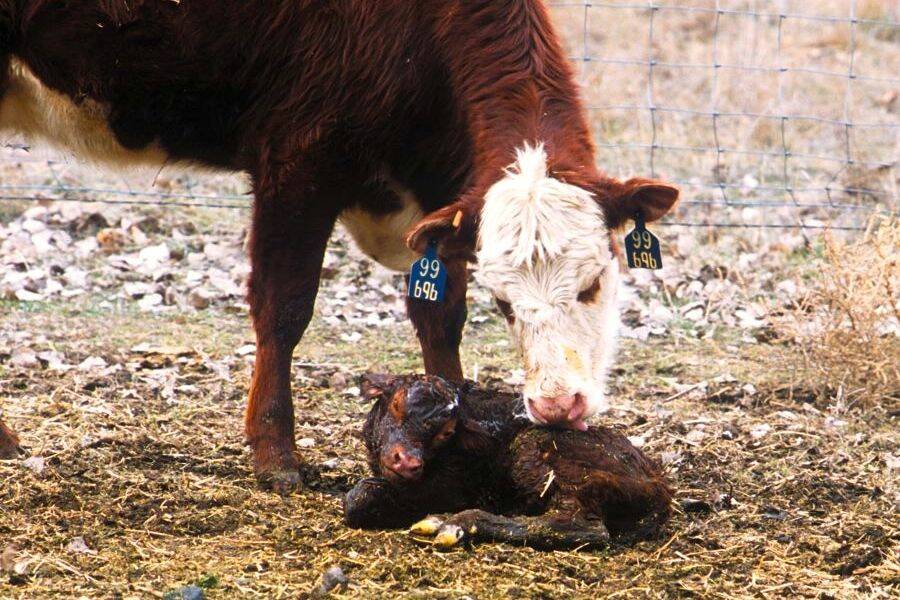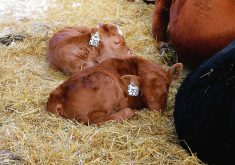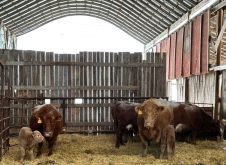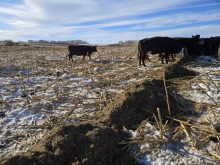Bryan Karwal raises and sells 18,000 Canadianborn hogs a year on his Iowa farm, but a new food-labelling law designed to help consumers threatens that business because it has shut off key markets for the hogs.
The law has also angered Canada and Mexico because they say it will hurt demand for their cattle and hogs. It has raised talk of a trade war among the three countries.
The law, called COOL, was implemented last month and requires that labels on supermarket packages of meat and other foods list all the countries where the food came from. The drive for such labels intensified after dairy products from China were tainted last year with the chemical melamine.
Read Also

Scours doesn’t hibernate: Infectious risks for cold weather calves
Identifying specific pathogens and management flaws is essential for effective calf scours treatment and prevention on your farm.
To better comply and to avoid stiff fines for labelling mistakes, U. S. beef and pork companies are either refusing or are segregating cattle and hogs born outside of the United States.
This has reduced markets for U. S. producers like Karwal, as well as for producers in Canada and Mexico.
“Right now, the way the situation is, several of the packers said because of COOL they are going to phase out Canadian pigs,” said Karwal of Elliott, Iowa.
That will leave him with only a few places to ship his hogs.
COOL stands for country-of-origin-labelling and applies to packages of fresh beef, pork, lamb, goat and chicken.
“Because of the global market, people want to know where their food comes from,” said Carol Tucker-Foreman, a food policy expert for the Consumer Federation of America, which pushed for the law. “The bottom line is some people want to buy from American producers.”
However, consumer groups say it is too early to determine if consumers are preferring U. S.-only foods.
Livestock producers and industry experts claim consumers will not care and that the extra cost and handling will hurt the meat industry. Plus, price, not country of origin, will guide purchasing decisions, they said.
“I just think retail customers are not going to care, so retailers are not going to care, so packers are not going to care, eventually,” said Steve Meyer, economist for the livestock consulting firm Paragon Economics.
Wal-Mart Stores Inc., the largest U. S. grocery chain, said that as long as meat packages are correctly labelled it does not have a preference regarding country of origin.
Beef and pork companies have been most affected by the law because they buy cattle and hogs from producers, who in turn may have bought them from someone else including Canadians or Mexicans, so paperwork is needed to assure country of origin.
U. S. chicken companies own their chickens from the eggs to the meat case, so compliance has been fairly easy.
Cargill Inc., JBS SA, Hormel Foods Corp., Seaboard Corp. and Smithfield Foods Inc., which together sell more than 50 per cent of U. S. pork, have either stopped buying Canadian hogs or will phase out such purchases.
Tyson Foods Inc., the No. 2 pork producer, said it will continue buying Canadian-born hogs.
Histor ically, the United States has been an important market for Canadian cattle and hogs and Mexican cattle, as the animals are fattened here and slaughtered in U. S. meat plants.
RETALIATION FEARED
Canada and Mexico oppose the law, claiming it will remove or restrict the United States as a market for their livestock. As a result, many businessmen worry the two countries, both important markets for U. S. goods including meat, will retaliate with tariffs or other action.
In December, Mexico briefly banned meat from 30 U. S. plants, some of which were the largest in the country. While Mexico said the action was due to sanitary reasons, several U. S. sources said Mexico was reacting to the labelling law.
“It was the first salvo,” said Don Close, marketing director for the Texas Cattle Feeders Association.
Mexico ships a large number of young cattle to the United States for fattening. Now U. S. beef companies are requiring that those cattle can only be slaughtered at certain plants.
Canada and Mexico are both considering taking their cases regarding restrictions brought on by COOL to the World Trade Organization (WTO).
“There is a great deal of concern that there will be a push-back from Mexico for unfair trade practices and whether the COOL regulation fits within NAFTA,” said Close.
NAFTA, or North American Free Trade Agreement, was implemented in 1994 to facilitate trade among the three countries.
U. S. and Mexican cattle producers also worry that if U. S.-only beef gains consumer acceptance non-U. S.-born cattle may bring lower prices.
“The worry is out there, but we are not seeing discounting at this time,” said Jim Robb, economist at the Livestock Marketing Information Center.
U. S. MEAT PLANTS MAY BE AT RISK
“I think the unfair trade practices are turning the integrated North American hog market in turmoil,” said Jurgen Preugschas, chairman of the Canadian Pork Council.
Preugschas says that without the five million to 10 million Canadian hogs each year, U. S. pork plants will not have enough hogs to operate efficiently.
“Long term it is going to probably end up shutting down some U. S. pork plants and putting more Americans out of work. Short term it is going to put some hog farmers in Canada out of business,” he said.
Ron Plain, agriculture economist at the University of Missouri, agrees and predicted at least one U. S. pork plant would close. “In the upper Midwest is where the plant shutdown ought to occur,” said Plain.
Most imported Canadian hogs are processed at U. S. Midwest pork plants.
















